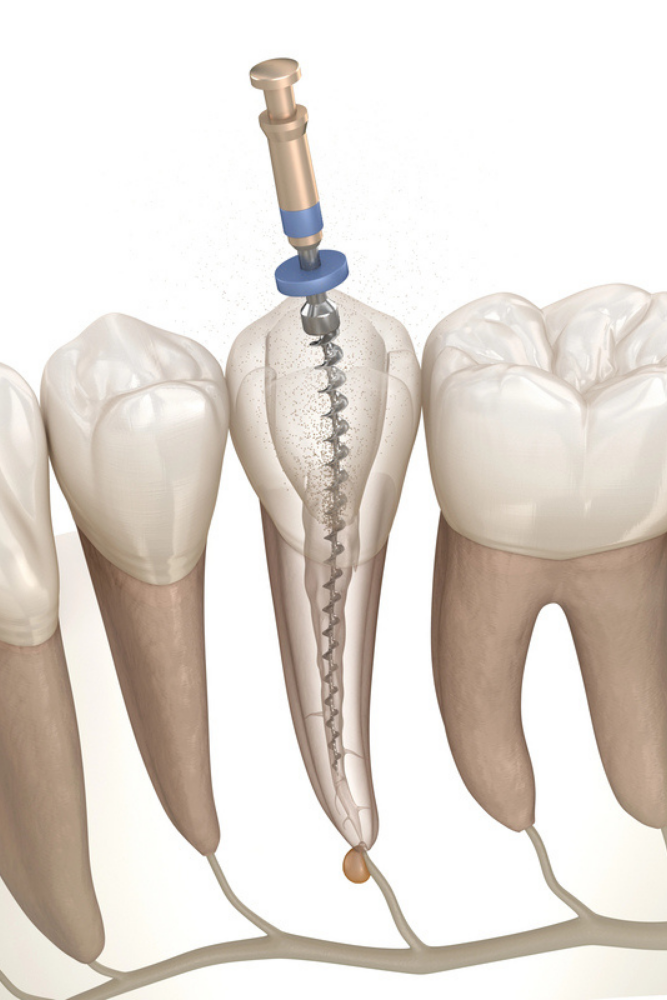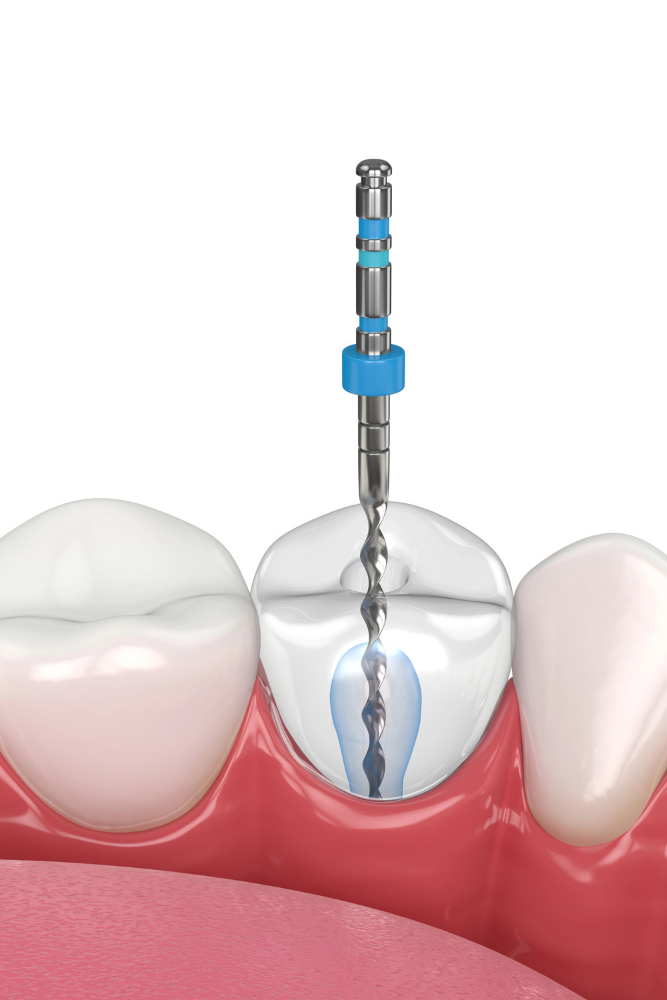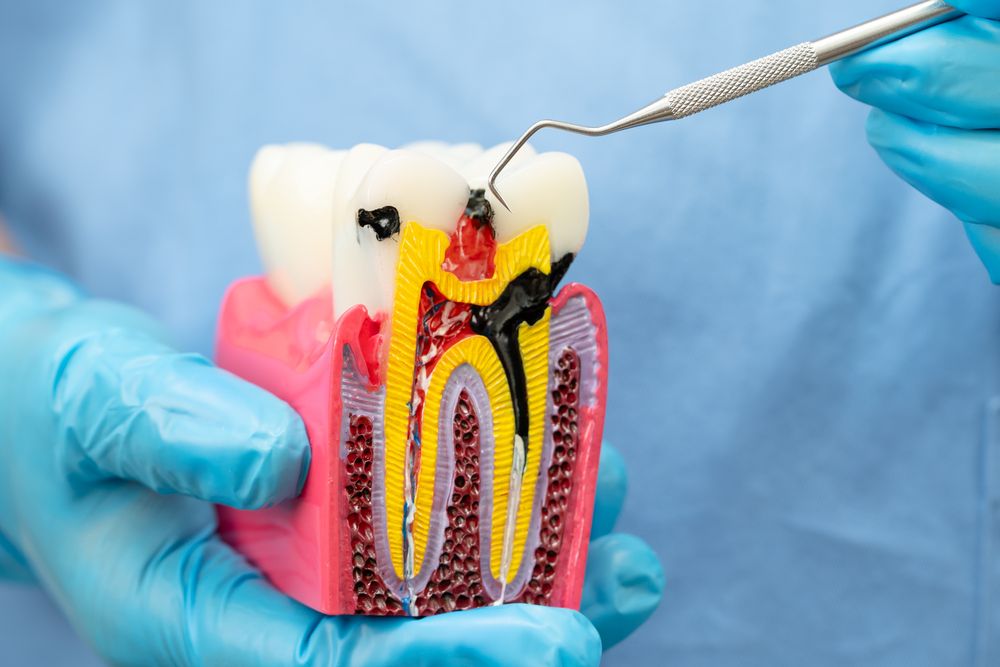Root Canal in Thornhill
Overview
At Thornhill Smiles Dental, located conveniently on Steeles Avenue West, our dental team is dedicated to preserving your oral health. A root canal procedure, also known as endodontic therapy, is a highly effective treatment designed to save a severely damaged or infected tooth from tooth extraction. When tooth decay, injury, or infection reaches the inner pulp chamber of a tooth, which contains nerves and blood vessels, this dental procedure becomes necessary. Our expert root canal treatment removes the affected tooth pulp, alleviates dental pain, and preserves your natural tooth structure, avoiding more complex dental services.
Signs You May Need a Root Canal
If you’re experiencing any of the following symptoms, it’s crucial to schedule one of your regular dental visits with our Thornhill dentist as soon as possible. These signs could indicate a dental emergency:
✔ Persistent dental pain, which can range from mild to severe
✔ Jaw pain or discomfort
✔ Swollen or tender gums around a tooth, which could be a sign of a dental absces
✔ Pain while chewing or biting down
✔ Extreme sensitivity to hot or cold foods and drinks
✔ Darkening or discoloration of a tooth
Seeking early treatment can sometimes prevent the need for one of our extensive root canals by allowing for a more minor intervention, such as a dental filling. If left untreated, an infected tooth and potential gum disease can worsen, spreading to surrounding tissues and bone and ultimately leading to tooth loss.


Common Causes of Root Canal Issues
A root canal may be necessary due to several factors that compromise the health of the tooth pulp:
✔ Tooth Decay: When a cavity is left untreated, bacteria can penetrate deep into the tooth, causing infection and inflammation of the pulp. If the damage is too extensive for a standard filling, a root canal is required.
✔ Chipped, Cracked, or Broken Teeth: A severe fracture in tooth structure can expose the inner pulp to bacteria, leading to pain and infection. In these cases, endodontic treatment helps restore and protect the tooth.
✔ Dental Trauma or Injury: A sudden blow to the mouth, even if the tooth doesn’t break, can damage the delicate pulp inside. This type of injury may require root canal therapy to prevent long-term complications and save the tooth.
What Happens During a Root Canal Procedure?
A root canal at our dental centre is a multi-step process designed to remove infection, relieve pain, and complete the tooth restoration:
1. Isolation & Numbing: First, our dental team ensures you are completely comfortable. A rubber dam is placed around the tooth to keep it dry and free from bacteria. We then administer local anesthesia, a numbing medicine, to guarantee a pain-free experience.
2. Cleaning & Shaping the Root Canals: A small opening is made in the tooth to access the pulp chamber. Using special files, the dentist carefully removes the infected pulp from the main canal and any smaller anatomical branches. The canals are then meticulously cleaned, disinfected, and shaped down to the root end (apex).
3. Filling the Canals: The empty space inside the root of the tooth is sealed with a biocompatible, rubber-like material called gutta-percha. This filling material seals the canals from the root tip up, preventing reinfection. A temporary filling may be placed to protect the tooth while the final restoration is being prepared.
4. Final Restoration: To protect and strengthen the tooth, a core buildup and a custom dental crown are typically placed over it. These dental materials ensure the tooth can withstand the forces of chewing. The type of crown used will depend on your needs, and our dentist at our dental office will discuss the best options with you.
Root Canals have a very high success rate. With proper home care and regular dental visits, a treated tooth can last a lifetime.
Aftercare and Recovery: Caring for Your Tooth
Proper home care is essential for a smooth recovery and the long-term success of your root canal treatment. Here is what you can expect and how to care for your tooth after your appointment:
Managing Discomfort
It is normal to experience some sensitivity or mild discomfort for a few days as the local anesthesia wears off and the area heals. This can typically be managed with over-the-counter pain medications like ibuprofen or acetaminophen.
Be Mindful When Chewing
Avoid chewing or biting down on the treated tooth until your final restoration (like a crown) is in place. Until then, the tooth is protected by a temporary filling and is susceptible to fracture. Try to stick to soft foods for the first day or two.
Maintain Oral Hygiene
Continue to brush and floss as you normally would, but be gentle around the treated area. Good oral hygiene is crucial to prevent any new infections.
Follow-up Appointments
It is vital to attend your follow-up appointment to have your permanent crown or other restoration placed. This final step protects the tooth from future damage and ensures its strength and function.
What if a Root Canal Fails? Understanding Retreatment
Sometimes, a tooth that has already received root canal treatment may not heal properly or can become reinfected months or even years later. This can happen due to a new injury, deep decay, or a complex canal anatomy with narrow or curved canals that were missed during the initial procedure. In these cases, a root canal retreatment is often the best option to save the tooth. The process involves reopening the tooth, removing the previous filling materials, and then carefully cleaning, disinfecting, and sealing the canals again. While our skilled team can perform some retreatments in-house, we are committed to ensuring the best possible outcome. For particularly complex cases, we will refer you to a trusted specialist (an endodontist) to guarantee the highest level of care.

When to Call Us: Please contact our dental office immediately if you experience severe pain that isn’t relieved by medication, visible swelling inside or outside your mouth, an allergic reaction to medication, or if your temporary filling comes out. You can call us at (905) 707 6477 or click here to book an appointment.
Your comfort and health are our top priorities. At Thornhill Smiles Dental, our experienced dental team uses modern techniques and technology to make your root canal procedure as smooth and painless as possible. We focus on clear communication and a gentle approach, ensuring you receive the highest standard of care from initial diagnosis to your final tooth restoration, all within our welcoming dental office.
Canadian Dental Care Plan (CDCP) Accepted
We are proud to participate in the Canadian Dental Care Plan (CDCP) to help make essential dental care more accessible. Our dental clinic accepts patients under this federal plan, covering various preventative care and restorative dentistry services, including professional cleanings and dental treatment.
If you are a member of the CDCP, please bring your member card to your next dental appointment. Our dental staff will help you understand your coverage and maximize your benefits for a healthier smile.
Our Office
390 Steeles Avenue West #205 Thornhill, ON L4J 6X2
Email: [email protected]
Phone: (905) 707 6477
Quick Links
Office Hours
Monday to Wednesday 9AM-8PM
Thursday and Friday 9AM-7PM
Saturday (Every Other)9AM-3PM
Sunday Closed
Don’t Endure Dental Pain. Schedule Your Root Canal Visit Today
An infected tooth will not heal on its own and requires professional care. If you are experiencing symptoms or have been told you need a root canal, contact our Thornhill Smiles Dental team. We are here to relieve your pain and save your smile.
1
Book an Appointment
Choose a time that works for you.
2
Download Patient Forms
Fill out your info at your own pace.

